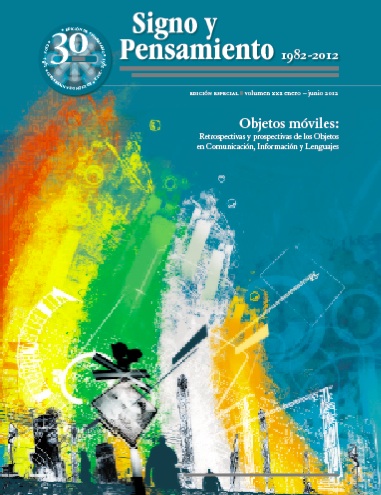Abstract
This article suggests a discussion about the implications that certain phenomena related to the “Information Society, Communication and Social-Educational Processes” have on university research development. This research topic is being dealt with in the PhD Program in Social and Human Sciences at Pontificia Universidad Javeriana. Some conceptual, methodological and axiological assumptions are set forth with the purpose of discussing and identifying the academic conditions and strategies shared by different projects aimed at training researchers in social and human sciences and in communication studies in Latin America.
— (2009), Communication Power, Oxford, Nueva York, Oxford University Press.
Menand, L. (2001), “The Marketplace of Ideas”, American Council of Learned Societies, Occasional Paper [en línea], núm. 49, disponible en http://archives.acls.org/op/49_Marketplace_of_Ideas.htm, recuperado: agosto de 2011.
Pontificia Universidad Javeriana (2011), “Sociedad de la información, comunicación y procesos socioeducativos” [en línea], disponible en http://puj-portal.javeriana.edu.co/portal/page/portal/Facultad%20Ciencias%20Sociales/doc_eje3, recuperado: agosto de 2011.
Schiller, H. I. (1983), El poder informático. Imperios tecnológicos y relaciones de dependencia, México, Gustavo Gili.
UNESCO (2005), Hacia las sociedades del conocimiento, París, UNESCO.
Wallerstein, I. (2004), The Uncertainties of Knowledge, Philadelphia, Temple University Press.
This journal is registered under a Creative Commons Attribution 4.0 International Public License. Thus, this work may be reproduced, distributed, and publicly shared in digital format, as long as the names of the authors and Pontificia Universidad Javeriana are acknowledged. Others are allowed to quote, adapt, transform, auto-archive, republish, and create based on this material, for any purpose (even commercial ones), provided the authorship is duly acknowledged, a link to the original work is provided, and it is specified if changes have been made. Pontificia Universidad Javeriana does not hold the rights of published works and the authors are solely responsible for the contents of their works; they keep the moral, intellectual, privacy, and publicity rights.
Approving the intervention of the work (review, copy-editing, translation, layout) and the following outreach, are granted through an use license and not through an assignment of rights. This means the journal and Pontificia Universidad Javeriana cannot be held responsible for any ethical malpractice by the authors. As a consequence of the protection granted by the use license, the journal is not required to publish recantations or modify information already published, unless the errata stems from the editorial management process. Publishing contents in this journal does not generate royalties for contributors.


